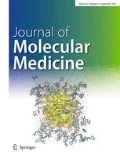Zusammenfassung
In vivo- und in vitro-Versuche mit niedermolekularem Dextran (Rheomacrodex®) ergaben im TEG eine Verlängerung der Reaktionszeitr und eine Verschmälerung der maximalen Amplitudema. In vitro waren Thrombinzeit und Recalcifizierungszeit verkürzt, bei hoher Konzentration verlängert. Die Gerinnselretraktion war beeinträchtigt. Fibrinogen wurde durch Dextran gefällt. Es wird angenommen, daß die Veränderungen im wesentlichen auf einer Hemmung des Thrombocytenfaktors 3 und einer Alteration von Fibrinogen-Fibrin beruhen. Durch Blutverdünnung bewirkt eine Rheomacrodex-Infusion darüber hinaus einen Abfall der Thrombocytenzahlen und des Fibrinogens. Bei Patienten mit einer Blutstillungsstörung sollte niedermolekulares Dextran nicht gegeben werden.
Summary
In vivo and in vitro studies with low molecular weight dextran (Rheomacrodex®) demonstrated a prolongation of the reaction timer and a decrease of the maximum amplitudema in the thrombelastogram. Thrombin time and recalcification time in vitro were shortened, with high dextran concentration prolonged. Clot retraction was impaired. Fibrinogen was precipitated by dextran. It is assumed that the changes are due essentially to impairement of platelet factor 3 and alteration of fibrinogen-fibrin. In addition by dilution of the recipient's blood an infusion of Rheomacrodex caused a decrease of the number of platelets and of fibrinogen. Low molecular weight dextran should not be administered to patients with hemorrhagic disorders.
Literatur
Bach, H. G., u.H. Graeff: Klinische Daten zur Wirksamkeit des niedermolekularen Dextrans. Geburtsh. u. Frauenheilk.24, 506 (1964).
Bennett, P. N., D. P. Dhall, F. N. McKenzie, andN. A. Matheson: Effects of dextran infusion on the adhesiveness of human blood platclets. Lancet1966 II, 1001.
Bergentz, S. E., O. Eiken, andI. M. Nilsson: The effect of dextran of various molecular weights on the coagulation in dogs. Thrombos. Diathes. haemorrh. (Stuttg.)6, 151 (1961).
Bloom, W. L., N. O. Fowler, J. A. Ward, andR. H. Franch: Hemodilution and changes in hemostasis induced by dextran. J. surg. Res.3, 152 (1963).
Carbone, J. V., F. W. Furth, R. Scott jr., andW. H. Crosby: An hemostatic defect associated with dextran infusion. Proc. Soc. exp. Biol. (N.Y.)85, 101 (1954).
Dhall, D. P., D. R. Harper, F. N. McKenzie, andN. A. Matheson: Aggregation of human platelets by dextran. Nature (Lond.)210, 745 (1966).
Nicola, P. de, G. M. Mazzetti etF. Soardi: Recherches sur les altérations hemostatiques provoquées par le dextran. Sang27, 708 (1956).
Dugdale, M., J. D. Nofzinger, andF. Murphy: Some effects of low molecular weight dextran on coagulation. Thrombos. Diathes. haemorrh. (Stuttg.)13, 118 (1966).
Ewald, R. A., J. W. Eichelberger, H. J. Young, andW. H. Crosby: The effect of dextran on platelet factor 3 activity: In vitro an in vivo studies. Transfusion (Paris)5, 109 (1965).
Eichler, J., u.G. Stephan: Verhalten der Blutgerinnungsfaktoren nach Infusion von Plasmaexpandern. Anaesthesist13, 102 (1964).
Gelin, L. E., K. Korsan-Bengtsen, J. Ygge, andB. Zederfeldt: Influence of low viscous dextran on the hemostatic mechanism. Acta chir. scand.122, 324 (1961).
Greaff, H., u.W. Kuhn: Beeinflussung der Vorphase der Gerinnung durch Dextran 150 In vivo-Studien am Kaninchen. Klin. Wschr.44, 646 (1966).
Howard, J. M., C. T. Teng, R. K. Loeffler, andA. Johnson: Studies of dextrans of various molecular sizes. Ann. Surg143, 369 (1956).
Jacobaeus, U.: Studies on the effect of dextran on the coagulation of blood. Acta med. scand., Suppl.322 (1957).
Krøll, J.: Studies on the effect of low molecular weight dextran upon the clotting process in vitro. Scand. J. clin. Lab. Invest.17, 51 (1965).
Kuhn, W., u.H. Graeff: Beeinflussung der Vorphase der Gerinnung durch Dextran 150 in vitro. Klin. Wschr.43, 1281 (1965).
Langdell, R. D., E. Adelson, W. F. Furth, andW. H. Crosby: Dextran and prolonged bleeding time. J. Amer. med. Ass.166, 346 (1958).
Laurell: Influence of dextran on the conversion of fibrinogen to fibrin. Scand. J. clin. Lab. Invest.3, 262 (1951).
Nilsson, I. M., andO. Eiken: Further studies on the effect of dextran of various molecular weight on the coagulation mechanism. Thrombos. Diathes. haemorrh. (Stuttg.)11, 38 (1964).
Ricketts, C. R.: Interaction of dextran and fibrinogen. Nature (Lond.)169, 970 (1952).
Robertson: Dextran und Gerinnungsmechanismus. In: Genese und Therapie des hämorrhagischen Schocks, hrsg. vonO. H. Just u.H. Lutz. Stuttgart: Georg Thieme 1966.
Ross, S. W., andR. V. Ebert: Microelectrophoresis of blood platelets and the effects of dextran. J. clin. Invest.38, 155 (1959).
Rothman, S., E. Adelson, A. Schwebel, andR. D. Langdell: Adsorption of carbon-14 dextran to human blood platelets and red blood cells in vitro. Vox Sang. (Basel)2, 104 (1957).
Ströder, J., u.W. Künzer: Ann. paediat. (Basel)188, 207 (1957).
Author information
Authors and Affiliations
Rights and permissions
About this article
Cite this article
Wehinger, H. Zur Beeinflussung der Blutgerinnung durch niedermolekulares Dextran (Rheomacrodex®). Klin Wochenschr 45, 1031–1035 (1967). https://doi.org/10.1007/BF01727813
Issue Date:
DOI: https://doi.org/10.1007/BF01727813

